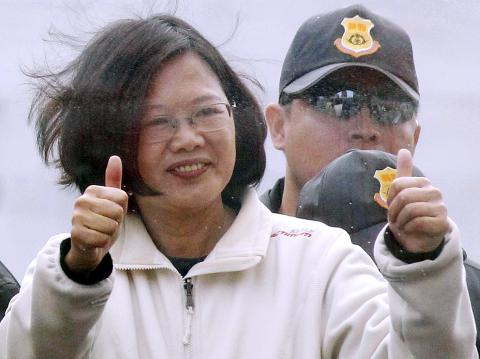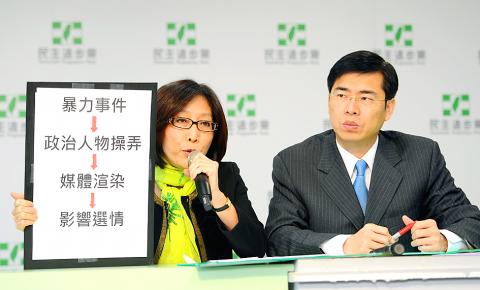The Democratic Progressive Party (DPP) yesterday warned of prevalent vote buying in central and southern Taiwan and the possibility of election-eve incidents today, urging authorities to step up investigations and security measures.
While voter turnout is regarded as one of the three key factors in the outcome of tomorrow’s presidential and legislative elections, vote buying and possible incidents pose greater concern, DPP spokesperson Chen Chi-mai (陳其邁) told a press conference.
Media reports of suspected vote buying were alarming and worrisome, Chen said, citing the case of Chung Shao-ho (鍾紹和), the Chinese Nationalist Party’s (KMT) legislative candidate in Greater Kaohsiung’s First District.

Photo: Reuters
Chung’s 50 campaigners were investigated on Wednesday for allegedly buying votes for NT$500.
Vote buying appears to be widespread in central and southern Taiwan, which the KMT has designated “crucial constituencies,” Chen said, calling on the judiciary to be proactive in its investigations of the allegations in those regions.
DPP presidential candidate Tsai Ing-wen (蔡英文) also raised the issue on the campaign trail, saying in Taoyuan that there had been rumors of vote buying in which the presidential and the legislative elections were being “bundled.”

Photo: Chang Chia-ming, Taipei Times
“If the rumors are true, it would be heartbreaking. If votes can be bought ... if the presidency can be bought, that would be the biggest disgrace for Taiwan and the -saddest thing that could happen to our democracy,” Tsai said.
The DPP also expressed concern over possible incidents prior to election day that might have an impact on the polls, such as the shooting of Sean Lien (連勝文), a son of former KMT chairman Lien Chan (連戰), on the eve of the special municipality elections in November 2010.
The incident was regarded by many analysts and observers as a determining factor in the outcome of one of the hotly contested elections, in which the KMT won three of the five mayoral seats.
“The last thing we want to see is a repeat of the 2010 shooting incident,” DPP spokesperson Kang Yu-cheng (康裕成) said.
Kang urged the National Security Bureau, which is charged with protecting the candidates, to increase its security for candidates, their families and senior politicians.
She also called on the media to refrain from sensational reporting, which could rile voters and incite conflict if an incident does occur.

Intelligence agents have recorded 510,000 instances of “controversial information” being spread online by the Chinese Communist Party (CCP) so far this year, the National Security Bureau (NSB) said in a report yesterday, as it warned of artificial intelligence (AI) being employed to generate destabilizing misinformation. The bureau submitted a written report to the Legislative Yuan in preparation for National Security Bureau Director-General Tsai Ming-yen’s (蔡明彥) appearance before the Foreign Affairs and National Defense Committee today. The CCP has been using cognitive warfare to divide Taiwanese society by commenting on controversial issues such as Taiwan Semiconductor Manufacturing Co’s (TSMC, 台積電) investments in the

INVESTIGATION: The case is the latest instance of a DPP figure being implicated in an espionage network accused of allegedly leaking information to Chinese intelligence Democratic Progressive Party (DPP) member Ho Jen-chieh (何仁傑) was detained and held incommunicado yesterday on suspicion of spying for China during his tenure as assistant to then-minister of foreign affairs Joseph Wu (吳釗燮). The Taipei District Prosecutors’ Office said Ho was implicated during its investigation into alleged spying activities by former Presidential Office consultant Wu Shang-yu (吳尚雨). Prosecutors said there is reason to believe Ho breached the National Security Act (國家安全法) by leaking classified Ministry of Foreign Affairs information to Chinese intelligence. Following interrogation, prosecutors petitioned the Taipei District Court to detain Ho, citing concerns over potential collusion or tampering of evidence. The

‘COMPREHENSIVE PLAN’: Lin Chia-lung said that the government was ready to talk about a variety of issues, including investment in and purchases from the US The National Stabilization Fund (NSF) yesterday announced that it would step in to staunch stock market losses for the ninth time in the nation’s history. An NSF board meeting, originally scheduled for Monday next week, was moved to yesterday after stocks plummeted in the wake of US President Donald Trump’s announcement of 32 percent tariffs on Taiwan on Wednesday last week. Board members voted to support the stock market with the NT$500 billion (US$15.15 billion) fund, with injections of funds to begin as soon as today. The NSF in 2000 injected NT$120 billion to stabilize stocks, the most ever. The lowest amount it

NEGOTIATIONS: Taiwan has good relations with Washington and the outlook for the negotiations looks promising, Minister of Economic Affairs J.W. Kuo said Taiwan’s GDP growth this year is expected to decrease by 0.43 to 1.61 percentage points due to the effects of US tariffs, National Development Council (NDC) Minister Paul Liu (劉鏡清) said at a meeting of the legislature’s Economics Committee in Taipei yesterday, citing a preliminary estimate by a private research institution. Taiwan’s economy would be significantly affected by the 32 percent “reciprocal” tariffs slapped by the US, which took effect yesterday, Liu said, adding that GDP growth could fall below 3 percent and potentially even dip below 2 percent to 1.53 percent this year. The council has commissioned another institution